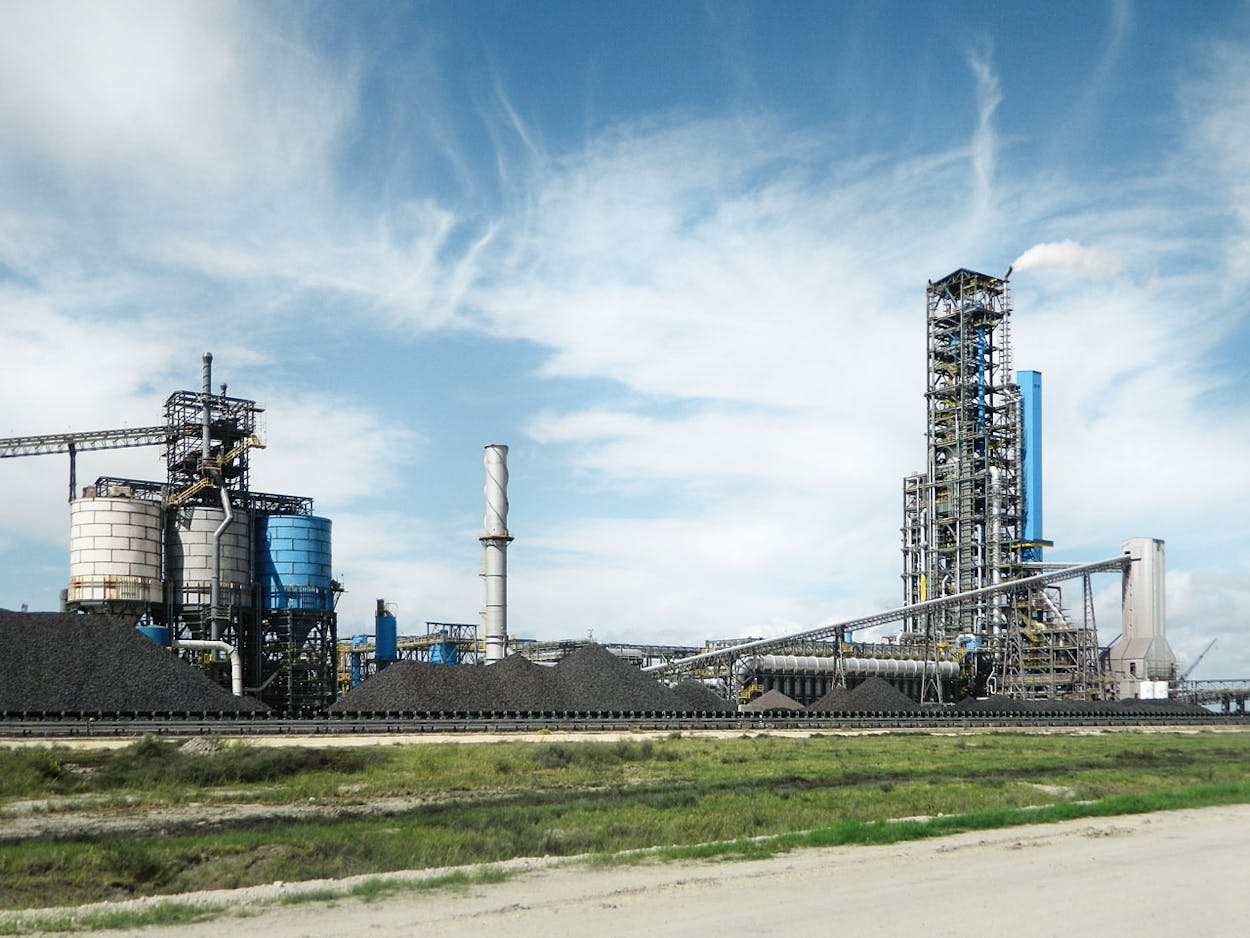Every other week, a cargo freighter loaded with about 100,000 tons of marble-sized iron ore pellets docks at a new, $740 million industrial plant on the shores of the La Quinta Channel, in the Port of Corpus Christi. There, the pellets are unloaded and placed on a conveyer belt that eventually carries them to the top of a 450-foot tower—the tallest building in South Texas—where they are superheated and exposed to hydrogen and carbon monoxide gas to reduce the iron’s oxygen content, leaving roughly 91-percent pure iron, which is then melted into candy bar-shaped bricks and sent back on the same conveyor belt to another cargo freighter.
This is what’s called a direct reduction plant, and the factory in Corpus Christi was opened last October by Voestalpine, an Austrian industrial behemoth that specializes in making high-quality steel for the German automotive industry. About half of the purified iron (known as hot-briquetted iron, or sponge iron) produced in Corpus Christi is destined for Voestalpine’s plants in Linz and Donawitz, Germany, where it forms the pre-product for steel that will end up in BMWs, Porsches, and Mercedes-Benzes. (Voestalpine sells the rest to various other companies around the world.)
“These days, cars are packed with gadgets, so everything’s getting heavier,” explained Matthias Pastl, Voestalpine’s head of corporate communications and environmental management, who gave a tour of the plant in October for the media. “So the rest of the car needs to get lighter, without compromising safety. And this is where our company comes in—we can offer very thin material. I always compare it to making a cake. If you want to make a gourmet cake, you need gourmet ingredients, and the same applies to the steel industry. You can’t melt an old fridge down to get body parts for a new Porsche 911. It just doesn’t work.”
The Voestalpine plant is just the latest addition to the numerous factories and plants in the Port of Corpus Christi, the fifth-largest port in the United States by tonnage. It also represents the largest-ever investment in the United States by an Austrian company, and a major vote of confidence in Texas’s lauded business climate. Voestalpine, which has 48,500 employees spread across five continents, scouted locations around the world before deciding to build its latest plant in South Texas.
Building the plant in Europe was out of the question due to the high cost of energy (the plant uses the equivalent of ten percent of Austria’s annual natural gas consumption) and the EU’s tax and regulatory burden, which Pastl estimated would have increased annual operation costs by 200 million euros. Building in Africa, South America, or the Caribbean would be cheaper, but came with a higher risk of political instability. “We’re a very risk-averse company—if we build a plant, we would like to keep owning it in the future,” Pastl noted.
After narrowing their search to Canada and the U.S., the Austrians eventually settled on Corpus Christi, in part because of tax abatements offered by San Patricio County. “You don’t come to Texas because you want to save on wages or salaries, because if you compare hourly wages here to in Austria, it’s actually not too far apart,” Pastl said. “The major difference is the tax burden and also the extra costs of labor introduced by governments in Europe. Texas is a region that appreciates manufacturing jobs—you have people here capable of working in such environments. You have contractors familiar with complex construction and maintenance.”
But anyone hoping that Voestalpine’s new plant heralds the American manufacturing renaissance promised by President Donald Trump during his campaign will likely be disappointed by the small number of local jobs this $740 million investment has created. Although up to 2,700 construction workers were employed over the two and a half years it took to build the plant, the plant is now staffed by just 190 full-time employees, five of them Austrian expats. The plant is so highly automated that most of those workers are there simply to maintain the equipment.
“This is an example of how job-light investment can be, especially in advanced manufacturing,” said Mark Muro, a senior fellow and and director of the Metropolitan Policy Program at the Brookings Institution. “That has been true for a while, and is becoming even more true with the next round of computerization and robotics. If you look at the broader manufacturing sector, the job intensity per million dollars of output has plummeted from about 25 jobs in 1980 to 6.5 jobs today. These aren’t incremental changes, these are substantial changes in the nature of industry in the United States.”
Ironically, it is precisely the increasing automatization of plants like Voestalpine’s that makes it economically feasible to build them in America rather than in countries with lower labor costs like China. And even China is swiftly transitioning towards an automated manufacturing sector dominated by advanced robots. China’s Foxconn, the primary manufacturer of Apple devices, plans to reduce its workforce by a third by 2020, largely by investing heavily in robotics.
“It’s great for Corpus Christi that these jobs are coming, and foreign direct investment is very important,” Muro said. “The issue is that we shouldn’t be promising large amounts of hiring from these plants—that does not reflect a modern view of manufacturing or production.”








